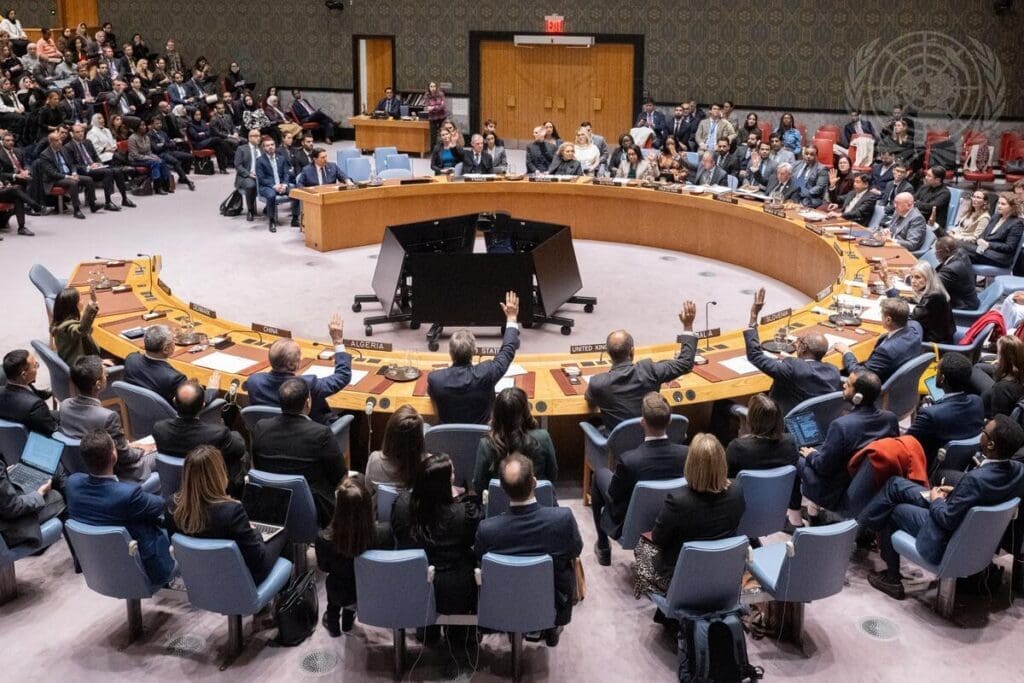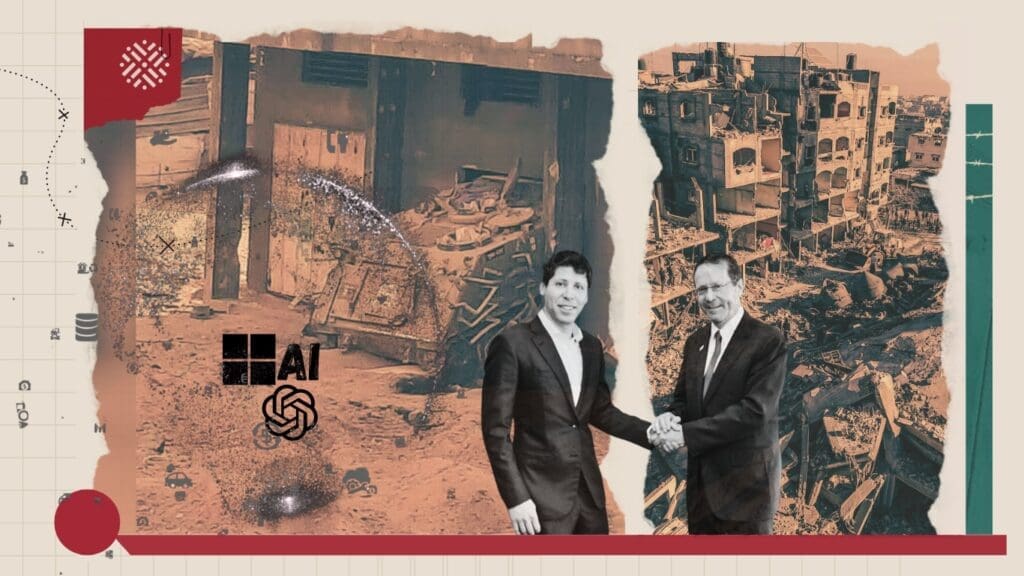- Topics
-
Topics
See our analysis on civil society and how it shapes culture, politics, and policies
Read our insights on the shifting political landscape and what it means for Palestine
Learn more about the policies and practices shaping the Palestinian economy
Strengthen your understanding of the unique conditions for Palestinian refugees across the Middle East
-
- Analysis
-
Analysis
In-depth analysis on existing or potential policies that impact possibilities for Palestinian liberation.
Insights and perspectives on social, political, and economic questions related to Palestine and Palestinians globally.
Concise analysis into a specific policy, its background and implications.
Commentary that brings together insights from multiple analysts.
Compilations of past Al-Shabaka works surrounding a specific theme.
Longer-form, ad hoc projects that seek to confront research questions outside the scope of our regular analysis.
A policy-driven research initiative by Al-Shabaka: The Palestinian Policy Network.
Our monthly webinar series that brings together Palestinian experts.
Featured
On November 17, 2025, the UN Security Council passed Resolution 2803 endorsing US President Donald Trump’s twenty-point plan for Gaza. The vote, pushed through after weeks of US pressure, establishes two supposedly “transitional” bodies to take control of Gaza: a Board of Peace tasked with overseeing aid delivery, reconstruction, and day-to-day administration, and an International Stabilization Force to take over security and disarm Hamas. Notably, the resolution does not refer to the genocide of the past two years, nor does it address accountability for it. Instead, this policy memo shows how the resolution repackages colonial control over the Palestinian people in Gaza, rewards the US—a co-perpetrator of genocide—with control over Gaza and its potentially lucrative reconstruction process, while simultaneously relieving the Israeli regime of all of its responsibilities as an illegally occupying power. Rather than advancing justice, the UN has once again undermined its own legal principles under US pressure. Yara Hawari· Nov 20, 2025Lebanese officials have revived calls to disarm Palestinian factions inside refugee camps, presenting it as part of efforts to curb “illicit weapons” and reinforce state sovereignty. Yet for many Palestinians and regional observers, the refugee-camp disarmament initiative signifies an attempt to recalibrate the region’s security landscape. It also revives traumatic collective memories of earlier disarmament campaigns that left camps exposed to massacres.
Yara Hawari· Nov 20, 2025Lebanese officials have revived calls to disarm Palestinian factions inside refugee camps, presenting it as part of efforts to curb “illicit weapons” and reinforce state sovereignty. Yet for many Palestinians and regional observers, the refugee-camp disarmament initiative signifies an attempt to recalibrate the region’s security landscape. It also revives traumatic collective memories of earlier disarmament campaigns that left camps exposed to massacres.
 US tech giants portray themselves as architects of a better world powered by artificial intelligence (AI), cloud computing, and data-driven solutions. Under slogans like “AI for Good,” they promise ethical innovation and social progress. Yet in Gaza, these narratives have collapsed, alongside international norms and what remains of the so-called rules-based order. Israel’s genocidal war on Gaza has highlighted the role of major technology companies in enabling military operations and sustaining the occupation. Beneath the destruction lie servers, neural networks, and software built by some of the world’s most powerful corporations. As Israel weaponizes AI and data analytics to kill Palestinians and destroy their homes, the militarization of digital technologies and infrastructures is redefining accountability and exposing a governance vacuum. This policy brief traces how corporate complicity now extends to war crimes, crimes against humanity, and genocide—and calls for urgent regulation of AI militarization.
US tech giants portray themselves as architects of a better world powered by artificial intelligence (AI), cloud computing, and data-driven solutions. Under slogans like “AI for Good,” they promise ethical innovation and social progress. Yet in Gaza, these narratives have collapsed, alongside international norms and what remains of the so-called rules-based order. Israel’s genocidal war on Gaza has highlighted the role of major technology companies in enabling military operations and sustaining the occupation. Beneath the destruction lie servers, neural networks, and software built by some of the world’s most powerful corporations. As Israel weaponizes AI and data analytics to kill Palestinians and destroy their homes, the militarization of digital technologies and infrastructures is redefining accountability and exposing a governance vacuum. This policy brief traces how corporate complicity now extends to war crimes, crimes against humanity, and genocide—and calls for urgent regulation of AI militarization. Marwa Fatafta· Oct 26, 2025
Marwa Fatafta· Oct 26, 2025
-
- Resources
- Media & Outreach
- The Network




Palestine and the Israel-Saudi Arabia Alliance
The October 2018 murder of Jamal Khashoggi by agents of the Saudi government in Istanbul brought into sharp relief the deepening relations between Saudi Arabia and Israel: Israel had supplied Pegasus spyware to the Saudi government, which it used to surveille Khashoggi, and two of the Saudi aides that Crown Prince Mohammed bin Salman (MBS) fired for playing a role in the murder had been part of clandestine Saudi outreach toward Israel, including efforts to soften Israel’s image in the Saudi press.1
In some ways, such acts should come as little surprise: The Israeli-Saudi convergence has been developing for years. Just months before Khashoggi’s murder, MBS proclaimed in a meeting with US-based Jewish groups that the Palestinians must accept US President Donald Trump’s “Deal of the Century,” saying that they should “agree to come to the negotiations table or shut up and stop complaining.”
What has the Israeli-Saudi relationship meant for Palestinians and the Palestinian struggle for rights, and how does Khashoggi’s assassination affect it? Al-Shabaka spoke with 24428, Al-Shabaka analyst and associate professor at the Doha Institute for Graduate Studies, about the implications of the Khashoggi crisis for Saudi Arabia, and what Palestinians can do to counter the damaging Israeli-Saudi alliance.
How has Khashoggi’s murder affected Saudi Arabia’s stature, particularly in regard to Palestine?
The crisis brought the Israeli-Saudi relationship into the public eye as it had not been before. The sale of the Pegasus spyware in particular revealed the two states’ military and security collaboration. This public exposure works against their relationship, as Israel and Saudi Arabia would be undertaking even more together if their collaboration was still secret. Exposing the relationship also puts the legitimacy of the Saudi regime into question, especially regarding Palestine, Jerusalem, and the Al-Aqsa Mosque. It raises serious concerns about the regime’s stature on the Arab street.
How has the crisis affected the Iranian-Saudi rivalry?
The exposure of the relationship is a gift to Iran. What better way to shore up Iran’s stature than to show that its rival is collaborating with Israel and compromising on the Arab and Muslim world? Iran has used this by hyping the Saudi regime’s friendship with Israel in its media. This is ironic: Saudi Arabia collaborates with Israel because it wants help countering Iran, but in fact, the collaboration strengthens Iran’s hand by giving it ammunition in the media war. It’s a self-defeating policy for Saudi Arabia.
The Israel-Saudi relationship puts the legitimacy of the Saudi regime into question, especially regarding Palestine, Jerusalem, and the Al-Aqsa Mosque Share on XWhat are other geopolitical repercussions for the Saudi regime?
Saudi Arabia’s belief that the road to the hearts and minds of the White House goes through Tel Aviv is in error. The American leadership currently in the White House – Trump, Secretary of State Mike Pompeo, and National Security Advisor John Bolton – does not need any convincing about Iran, and as such Saudi Arabia does not need to work with Israel to achieve its agenda against the Islamic Republic.
In fact, working with Israel puts the Saudis in a dangerous position, because Saudi Arabia has made itself vulnerable to Israeli exploitation. For instance, in the aftermath of Khashoggi’s killing, Israeli Prime Minister Benjamin Netanyahu spoke publicly about the need for a stable Saudi Arabia despite the murder. Israel will ask for a high price for such support. Saudi Arabia’s position in the US is also difficult now, with Congress seeking to sanction the Saudi regime.
What policy recommendations do you have for Saudi Arabia?
Saudi Arabia should cease all ties of collaboration with Israel, which in reality is not needed for its security. The US makes hundreds of billions of dollars in arms sales to Saudi Arabia every year, and as a result, the US offers the security Saudi Arabic needs vis-à-vis Iran. But ultimately, Saudi Arabia should work to develop its own security strategy that is not dependent on the US. It should also return to supporting its Arab Peace Initiative, endorsed by the Arab League in 2002, 2007, and 2017. Deviating from this initiative has lost Saudi Arabia soft power, decreased its regional leadership, and brought even more negative consequences to the Palestinians. Finally, the regime should be transparent about the Khashoggi killing, as no actors are taking its “investigation” seriously. This is how it can exit the crisis.
How should Palestinians and their allies approach the Israeli-Saudi relationship?
The Palestinians are in a tough position. Despite all that’s happening, I would recommend that they not abandon Saudi Arabia, as this will also play into the hands of the Israeli government. Through engagement, there is more of a chance for Saudi Arabia to return to the Arab Peace Initiative. The Palestinian leadership should also remember that King Salman, MBS’s father, has shown a more serious position when it comes to Palestine, both before and after his son’s statement on the “Deal of the Century.” It is generally believed that the king does not support MBS’ views on Palestine.
The Saudi public is very supportive of the Palestinians, and this gives Palestinians leverage Share on XMoreover, the Saudi public is very supportive of the Palestinians, and this gives Palestinians leverage. Although Saudi Arabia has a highly centralized system, leaving little room for civil society, Palestinian opinion leaders and writers can reach the Saudi public through their writing. From the Washington Post to Al-Hayat to Al-Shabaka, Palestinians can spread public awareness about their quest for their rights and how the Israeli-Saudi relationship impedes it. We should not underestimate the importance of such awareness regarding the Palestinian question.
Ibrahim Fraihat
Latest Analysis
Trump’s UNSC Resolution 2803: Repackaged Colonial Rule
Palestinian Camps in Lebanon: Disarmament, Rights, and Return
AI for War: Big Tech Empowering Israel’s Crimes and Occupation
We’re building a network for liberation.
As the only global Palestinian think tank, we’re working hard to respond to rapid developments affecting Palestinians, while remaining committed to shedding light on issues that may otherwise be overlooked.